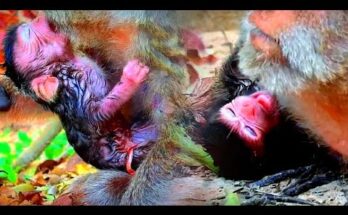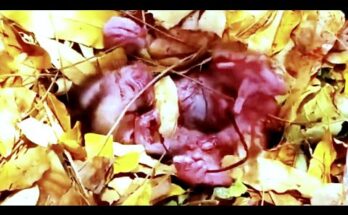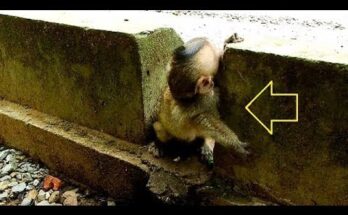
No warm embrace.
No familiar heartbeat.
No milk.
Only the cold breath of the forest morning, brushing against the frail form of a newborn monkey left alone in a world that no longer holds space for him.
He lies curled on the forest floor, skin barely hidden beneath tufts of soft, translucent fur. His limbs tremble uncontrollably, his tiny chest rising and falling with the shallow gasps of a body struggling to understand where warmth has gone. The ground is damp beneath him, littered with fallen leaves and sharp twigs that press against his delicate skin—but he has no energy to move. No strength to protest.
His eyes, too wide for his face, search the canopy above. He doesn’t know what to look for—only that something is missing. The one he knew before he knew anything: Mother. Her scent, her sound, her milk. Her heartbeat, once the rhythm of his entire world. But she is gone. Whether by choice, accident, or the cruelty of predators, her absence is all that remains.
And he is too young to understand why.
With what little strength he has, he tries to cry. The sound is faint, barely more than a whisper. A high-pitched whimper that rises into the cacophony of the jungle and is swallowed whole by louder, stronger voices. Birds shriek, insects buzz, monkeys call across the trees—but none call back to him.
He is invisible in the eyes of the forest.
Nearby, adult monkeys move through the branches—alert, cautious, busy. One female pauses. Her eyes settle on the trembling bundle of fur below. There is a flicker in her gaze—perhaps memory, perhaps pity. But her own infant clings to her belly, nursing greedily, and the weight of motherhood allows no room for another. She watches a moment longer, and then, without sound, turns away. Her body disappears into the canopy, leaving the silence even heavier.
Still, the baby crawls. Slowly. Desperately. His movements are uncoordinated—instinct without stamina. He paws at the dirt, reaching for something, anything, that might replace what he’s lost. But leaves are not arms. Bark is not a breast. And the earth does not answer when you cry.
His hunger deepens into agony. His belly, swollen from emptiness, contracts with every whimper. His fingers clutch at stones. His mouth roots against nothing. His instinct, once so sharp, begins to fray into confusion.
Time slows.
Flies begin to circle. Ants find his unmoving limbs and explore them without resistance. He doesn’t flinch. Doesn’t brush them off. Even pain takes energy now—and that, too, is fading.
And yet, through all of it, he keeps his eyes open.
Because some part of him still believes. Believes that she will come back. That a shadow will appear above him, arms will reach down, and everything will be as it was. That he will be lifted. Cradled. Fed. Loved.
But no shadow comes.
And as the final light drains from his eyes, a soft breath escapes his lips. The last one. A breath too small to stir a leaf.
The forest does not stop. Life moves. Birds sing. Trees sway. Monkeys leap. Somewhere nearby, another baby is born, and another mother nurses. The cycle continues. But in this quiet patch of earth, a profound loss has just occurred.
A life that had only just begun… ends.
Unnoticed.
Untouched.
Unloved.
And the world doesn’t mourn him. But if you listen—really listen—you may hear something in the silence. A hollow note hidden in the wind. The echo of a final cry that no one answered. The sorrow of a bond that broke before it ever had the chance to grow.
Because in nature, not all tragedies are loud.
Some pass without violence. Without blood.
Some leave no mark at all.
Except the ache in your heart when you realize:
He was waiting for love that never came.


